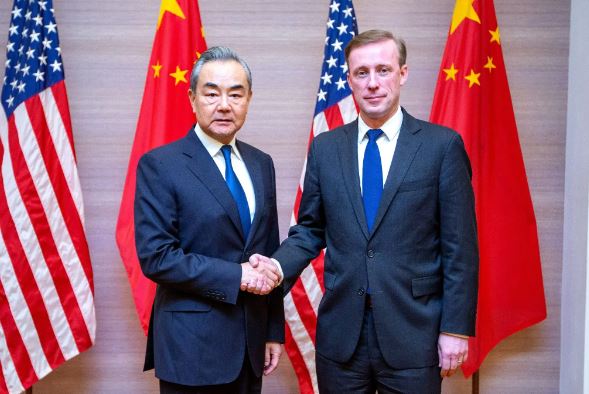China and the United States have returned to diplomatic negotiations, with discussions in Bangkok and Beijing signaling a tentative thaw in relations following a summit between President Biden and China’s leader, Xi Jinping, near San Francisco in November. The talks have covered various issues, including North Korea, Iran, and the resumption of discussions on curbing the flow of fentanyl to the United States. While these discussions point to a potential easing of tensions, the two nations continue to grapple with defining their relationship and navigating the complexities of their strategic competition.
The Biden administration characterizes the relationship between the U.S. and China as one of strategic competition, emphasizing the need to manage frictions to prevent conflict. However, Chinese officials reject this framing, viewing it as a veiled attempt at containment. Instead, they promote the “San Francisco Vision,” a catchphrase suggesting an agreement between Xi and Biden to stabilize relations and set aside competition. This disparity in rhetoric underscores the delicate nature of the current diplomatic reset, particularly as the U.S. heads into an election year, with Biden facing pressure to take a tough stance on China.
One positive outcome from the San Francisco summit that President Biden can highlight is the resumption of talks on fentanyl. China is a major source of chemicals used to produce fentanyl, a synthetic opioid responsible for significant fatalities in the United States. The talks represent a notable step forward in addressing a shared concern, with the U.S. seeking China’s cooperation to restrict the exports of fentanyl precursors. The Biden administration agreed to lift sanctions on a Chinese forensics institute, a demand made by Beijing to resume talks on fentanyl.
Beyond fentanyl, the two nations have restarted talks between their militaries and are expected to engage in discussions on mitigating the risks associated with artificial intelligence technology. China’s diplomatic efforts are partly aimed at presenting itself as a responsible global player, working to stabilize relations and address shared challenges. However, the geopolitical landscape remains complex, particularly in areas where China holds significant influence, such as the Middle East and the Korean Peninsula.
On the Korean Peninsula, China prioritizes preserving North Korean leader Kim Jong-un’s regime to maintain a crucial buffer between its border and U.S. troops in South Korea. This strategic imperative makes Beijing cautious about exerting too much pressure on Pyongyang. In the Middle East, China balances its desire to reduce tensions in the Red Sea, where it has substantial investments, with its broader goal of countering U.S. global dominance. Despite diplomatic efforts, some issues may resist resolution due to the limitations imposed by each nation’s strategic interests.
While both countries seek cooperation on specific issues, the broader narrative of their relationship remains contentious. China’s emphasis on treating each other as equals rather than subscribing to a condescending approach indicates its desire to engage on its own terms. The Biden administration, meanwhile, aims to balance cooperative efforts with the need to address issues where the U.S. and China remain at odds.
As the U.S. plans a phone call between President Biden and Xi Jinping in the coming months, China underscores its expectation that both nations should engage on equal footing. Chinese propaganda outlets emphasize the need for the U.S. to appreciate China’s goodwill, especially regarding discussions on fentanyl. This delicate balance reflects a temporary easing of tensions, allowing both nations to pursue their interests while avoiding a further deterioration in relations.
However, analysts caution that this détente may serve as a tactical pause for China, allowing Xi Jinping to focus on addressing domestic economic challenges. The broader strategic competition, particularly on issues considered core interests by China, remains unchanged. The diplomatic thaw is seen as a calculated move by Beijing to buy time and manage its economic issues, rather than a fundamental shift in its resolve on critical matters such as Taiwan and the Communist Party’s rule.
the recent diplomatic engagements between the U.S. and China signify a tentative thaw in relations, with both nations working to manage specific frictions. While cooperative efforts on issues like fentanyl represent positive steps, the broader strategic competition and differences in defining the relationship remain significant challenges. The delicate balance between cooperation and contention underscores the complexity of navigating U.S.-China relations in the current geopolitical landscape.

